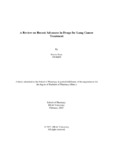A review on recent advances in drugs for lung cancer treatment
Abstract
One of the predominant reasons for cancer-related fatalities worldwide is lung cancer. Existing drugs in the therapeutic landscape though beneficial are linked with various limitations. Overcoming these posed a major challenge. However, significant progress has been made in the development of novel drugs to treat lung cancer in recent years. The advancements can be attributed to development of newer agents in existing classes of drugs and targeting new aberrations in genes associated with particularly non-small cell lung cancer that was previously impossible. They have improved treatment outcomes and prolonged survival in patients. Regardless, they are also associated with their own set of limitations. To this date, development of drugs that can target specific genetic changes for small cell lung cancer is deemed to be arduous. This review has delineated information related to the existing drugs in use, the novel agents and the combination drugs in use during the recent years.

